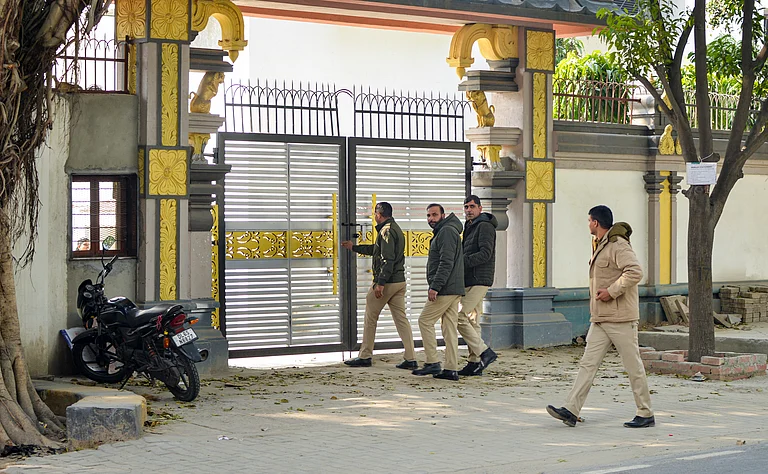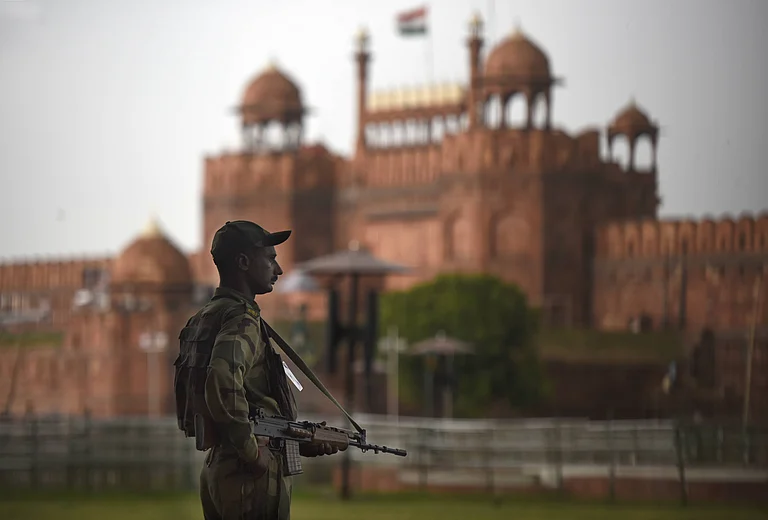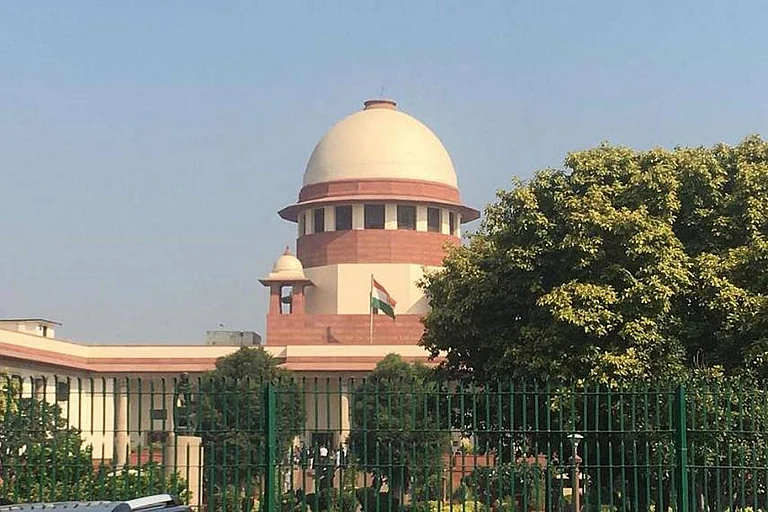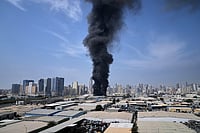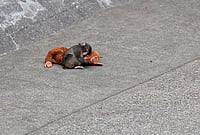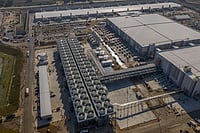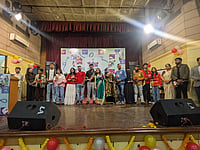
On November 10, a massive blast rocked Delhi’s Red Fort area, killing 13 people and injuring 27.
Investigating agencies have said the attack is likely related to a “white collar terror module” that was busted on the same day in Faridabad.
Since then, the internet has exploded with hate speech against the Indian Muslim community, and especially Kashmiris, after a doctor from Pulwana was implicated in the incident.
When, on November 10, an i20 exploded and killed 13 people near the Red Fort area in New Delhi, it also blew open fissures in the country’s social fabric. While the nation collectively mourned, several people were quick on the draw to blame the attack on the Muslim community.
From online harassment to intimidation in their daily lives, Muslims have found themselves under attack from their own countrymen.
Muslims across many states, particularly students, have reported feeling increasingly uncomfortable and scared.
A Kashmiri Muslim student, who travelled to Delhi in September to prepare for his Phd entrance exam, shared his experience of the shifting atmosphere following the Red Fort blast.
“The atmosphere has genuinely changed after the Red Fort blast,” he said. “When I heard that the accused were mostly Kashmiri Muslims, I honestly felt a wave of tension. I could sense the rise in anti-Muslim and anti-Kashmiri comments online, and it made me worry about how people around me might react.” Since then, he and others have been “keeping our heads down, avoiding crowded places, speaking less, and even thinking twice before speaking Kashmiri in public because we don’t want to draw unnecessary attention.”
Though he has not faced any confrontation, he noted “small passive-aggressive remarks, longer stares, and a general sense that people look at us with suspicion,” making everyday activities feel heavier.
“What hurts the most is seeing innocent Kashmiri Muslims being blamed for something they had no role in, and feeling the gap between communities quietly grow,” he added. The overall atmosphere, he concluded, has become uncomfortable, with many simply trying “to stay low-profile and get through our days without attracting any negativity.”
The student has wished to remain anonymous.
Hate As The New Normal?
When a doctor from Pulwana was implicated in the blast, Jammu and Kashmir Chief Minister Omar Abdullah, who had condemned the Red Fort attack within hours of it taking place, also appeared to be anticipating discrimination against people from the Union Territory. “Not every Kashmiri Muslim is a terrorist,” the J&K CM asserted.
However, on social media, troll armies launched coordinated attacks on Indian Muslims and Kashmiris, including personal attacks, threats, and calls for collective blame.
Multiple social media users posted inflammatory remarks that intensified communal tensions. On X (formerly Twitter), blue-tick user @iamrajesheha wrote: “Well, the terrorists who caused this heinous incident (Delhi #RedFortBlast) are the Indian muslims & that too Doctors! So, how can someone not insult or point fingers towards the Muslims? In this whole world, if any terror attacks are happening, it’s all because of that 1 community.”
Another user, @GaneshJayabalan, added: “Bomb blast in Red Fort Blast 8 dead, many injured... Working here, Got better education, Living comfortably, But their religious mindset never changes.” An account named @51centurywhere wrote: “I blame this hawasi for today’s attack on Red Fort in Delhi. If Mahatma Gandhi had not allowed Muslims to enter India, this blast would not have happened today. #RedFort.”

Meanwhile, @SunnyBabu3377 posted a long list of attacks attributed to Muslims, writing: “Pulwama attack—Muslims did it. Amarnath attack—Muslims did it. Akshardham attack—Muslims did it. Kandahar IC814 Hijack—Muslims did it. Kashmiri Hindus' exodus—Muslims did it. Pahalgam Terrorist Attack—Muslims did it. Red Fort Bomb Blast—Muslims did it. #Delhi #RedFort.”
Many in these communities describe a sense of being constantly watched or judged for events to which they had no connection.
Hamza, a freelance photojournalist based in New Delhi, said he wasn’t surprised by the fallout.
“I didn’t feel extra uncomfortable because for the last five to ten years we’ve been seeing this kind of atmosphere. Whenever we travel or go to public places, we face some discrimination because of our religion, and we’re open about it,” he said. “This act is wrong and we should condemn it. We can’t accept hate or violence in Gandhi’s country. But we also know that when something happens, the whole community gets blamed.”
He added that people rarely ask the government how such things keep happening, despite claims that everything is safe. Instead, they point at the community—the second-largest in India. "For a week or month, there’s talk, online criticism, sometimes abuse on the street, and then it all fades away, but the prejudice always stays, it's deep inside, but it's always there to jump when such incidents happen.
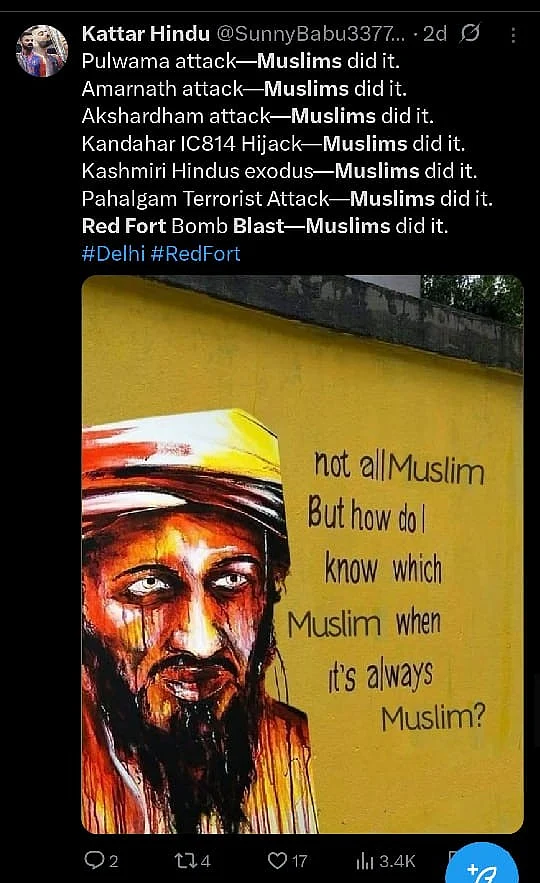
But, it’s not a new pattern. After the Pahalgam attack in April this year, hate speech against, and communal attacks, on Muslims rose sharply. Citizens for Justice & Peace (CJP) recorded over 180 hate attacks on Muslims, of which “37 per cent were tied to revenge” in the two months following the Pahalgam killings. CJP mapped out this trend in five states, among them: Uttar Pradesh, Uttarakhand, Maharashtra, and Madhya Pradesh.
“This…spike in attacks on India’s religious minorities must be contextualised — there is an establishment of a “new normal”,” said CJP.
Another user, @rexrao52, commented: “Another blast in Red Fort ...trust no one will talk about Ganga Jamuna tehzeeb ...these Muslims don’t belong here ...apart from everything else they’re absolutely unhinged ....send them back where they belong ..”

Even satire was weaponised to target Muslims: @Indic_God mocked anti-Muslim hate by pretending dogs were offended at being compared to Muslims, writing: “DOGESH feeling absolutely disgusted and sad after being compared to muslims post Bomb blast in Delhi near Red fort. Dogesh community is loyal, unlike Muthalmaans. JUSTICE FOR DOGESH.”
After The Blast– IDs checked, Fear and Anxiety Among Muslims In India
The blast itself left a trail of devastation. Families are still struggling with the sudden loss of loved ones, and people far from the site have felt the impact. Online discussions, now inflamed with communal comments, have multiplied, fueling fear and anxiety among Muslims.

In this tense environment, the Gurugram Police issued an order asking housing societies, PGs, guest houses, and landlords to submit detailed lists of tenants, including ID proofs. The directive, issued under Section 163 of the Bharatiya Nagrik Suraksha Sanhita, specifically requested separate lists of residents from Jammu & Kashmir and foreign nationals. Authorities said it was part of routine security verification ahead of New Year's Day and Republic Day, reported The Scroll.
The order has added to a growing sense of suspicion and unease. Combined with online trolling and targeted harassment, the atmosphere has left Muslims across the country anxious, unsure how to navigate daily life without becoming a target themselves.
On the night of 14th November, the family home of Umar Nabi, the doctor accused of driving the i20 that exploded near Delhi’s Red Fort Metro station on Monday, was demolished in his native village of Koil, in Pulwama, Jammu and Kashmir.
The move sparked widespread criticism. Srinagar MP Aga Ruhullah Mehdi condemned the demolition, saying it inflicted collective suffering rather than delivering justice.
“Making an entire family homeless during the harsh winter in Kashmir, without evidence, a court order, or any law linking them to the incident, is an act of cruelty,” Mehdi said. “It does not bring justice to the innocent lives lost in the terror attack, nor does it achieve the aims of justice.”
He called for the “actual perpetrators” to be held accountable through lawful investigation, warning that mass detentions, coercive interrogations, and extrajudicial demolitions “will not bring peace—they will set Kashmir back by decades.”
Saqib, a resident of Kashmir, voiced concern over both the incident and its aftermath. “Any attack is sad,” he said. “But when the accused turned out to be Kashmiri Muslims, many of my friends and people I know in Delhi and other cities faced a lot of anger and hostility. Anti-Muslim and anti-Kashmiri comments spread quickly on social media, and it naturally makes us feel vulnerable. Every time something like this happens, we’re treated as ‘the other’—Muslims, especially Kashmiris, end up as an outlet for people’s frustration.”
He also criticised the government’s response. “When authorities act before anyone is proven guilty in court, like demolishing a house that was home to many, it feels unfair and wrong,” he said. “It seems they’re trying to satisfy a certain group, calm their own conscience, and show they’re taking action—even if it marginalises one community. That’s not right, and it’s against the law.”
The aftermath of the Red Fort attack highlights more than the immediate loss of life; it has also exposed the fragility of social cohesion. While terrorism itself demands a collective response, fear and prejudice risk deepening communal divides instead. For many Muslims and Kashmiris, the past week has been a reminder that in times of crisis, suspicion can spread as quickly as grief, leaving ordinary people caught in the crossfire.








